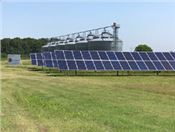|
Solar Leases: National Ag Law Center Guides Outline What You Need To Know

Solar panels installed at the of farm of AJ Hood
in Desha County, Arkansas, to power his grain storage facilities.
Image courtesy AJ Hood
FAYETTEVILLE, ARK.
With a spike in the solar industry, many landowners are leasing their property to solar developers as a form of extra income. However, these specialty leases present some unique legal concerns.
The National Agricultural Law Center has published two guides to help landowners navigate solar leases. “The Farmland Owner’s Guide to Solar Leasing” and “Understanding Solar Energy Agreements” are meant to help landowners fully understand the risk, challenges and responsibilities that come with solar leases. Each guide has a different focus.
Farmland Owner’s Guide to Solar Leasing
This guide serves as a tool to help landowners in general, but especially owners of farmland understand solar energy development and the solar leasing process. It covers topics such as property taxes, government programs, common legal documents and much more.
The NALC partnered with several authors, including Peggy Kirk Hall, Director of the Ohio State University Agricultural & Resource Law Program, Evin Bachelor, Senior Research Associate for the Ohio State University Agricultural & Resource Law Program, and Eric Romich, Associate Professor and Field Specialty for Ohio State University Extension to complete this guide.
Understanding Solar Energy Agreements
This guide, written by Shannon Ferrell, a professor at Oklahoma State University, covers many aspects of solar energy agreements that landowners should know when considering and negotiating leases. It discusses how agreements might affect other land usage, typical payment structure, the responsibilities of each party and much more.
“Leasing land for solar energy development is gaining popularity in some areas of the country,” NALC Director Harrison Pittman said, “and we want to help our stakeholders navigate this industry as easily as possible. As a result, we’ve partnered with experts in different parts of the country to develop two handbooks for landowners potentially interested in leasing their land. ∆
|
|